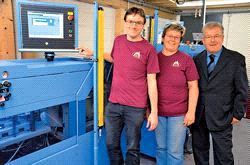Finishing & Screen Printing
Mönch bookbindery in Leipzig: Pioneer in Shorter Signatures

Wednesday 30. April 2014 - The Mönch bookbindery in the city of Leipzig in eastern Germany has produced thread-sewn books with shorter signatures for over a decade - first manually, and now industrially using the Tween option on the Ventura MC book sewing machine. "In order to make print products more attractive, you have to try something new from time to time," believe the two innovative company owners Bettina and André Mönch.
It was exactly ten years ago that a thread-sewn book by the artist Olaf Nicolai and produced by the Mönch bookbindery was awarded the top prize, the Golden Letter, at the Leipzig book fair. The book titled Rewind – Forward, which was released by the renowned publishing company Hatje Cantz Verlag, features numerous shorter signatures, which lend the 168-page art book a special appeal. Just as the German artist from Halle is famous in his home country and beyond for his conceptual artworks using a wide range of media, so too is the Mönch bookbindery known for its flair for creative print products.
A Product Becomes Popular
What required Bettina Mönch’s dexterity using a book sewing machine operated by foot pedals for the book that debuted in 2003 has now become industry standard. “More and more customers, mainly from the art scene, are keen to enhance thread-sewn books with short signatures,” says Bettina Mönch, a trained assortment bookbinder. She took over the company’s operations in 1987 towards the end of the GDR era from her grandfather Werner Kretzschmar and has run it together with her brother André Mönch since 2003.
The family business, whose eight employees and two apprentices produce in one shift, has become increasingly well known thanks to word-of-mouth marketing. Its circle of customers has grown over the years, as have its runs of thread-sewn books featuring shorter signatures. Today its runs are sometimes as high as 1,000 copies. Naturally, runs of that size cannot be processed manually using the book sewing machine from their grandfather’s days.
Dare to Take Risks
In order to be able to produce shorter signatures cost-effectively and increase its capacity, the Mönch bookbindery, which concentrates fully on print finishing, turned to Muller Martini, and essentially set the development of the Tween option on the Ventura MC book sewing machine in motion. It is no coincidence that the Mönch bookbindery has virtually become the pioneer of the shorter signatures option. The company, which moved into the Tapetenwerk, a creative quarter for artists located on the site of a former wallpaper factory, in 2007, has always dared to take risks. “In order to make print products more attractive and ensure they stand out, you have to try something new every now and then,” say Bettina and André Mönch, especially given the increasing competition from electronic media.
Offset and Digital
His sister recognizes that “thread-sewn books with shorter signatures will remain a niche”. However, Bettina Mönch is confident that demand for such products with integrated foils, transparent paper and various different fold types will increase, not least because of the growing popularity of the digital segment. André Mönch, who himself operates the Ventura MC and a 1571 gathering machine from Muller Martini recently acquired on the secondhand market, has observed that he is processing increasing numbers of digitally printed jobs.
The result is that the runs of (exhibition) catalogs, book covers, dissertations and Bachelor’s and Master’s theses in the A5 to A4 range, which are ordered by printing plants, publishers, industrial customers, graphic designers, advertising agencies and galleries, artists and private individuals from Leipzig to Berlin, are on the decrease. Currently, however, the number of signatures gathered in-house, pre-inserted via a brochure line or delivered is growing steadily.
That is why André Mönch changes over the new book sewing machine up to seven times daily. He benefits not only from the fact that the Ventura MC is designed both for offset and digital: “I also like its high level of flexibility, high production speeds, the opening system, the tight stitching and, in particular, the short threads.”
